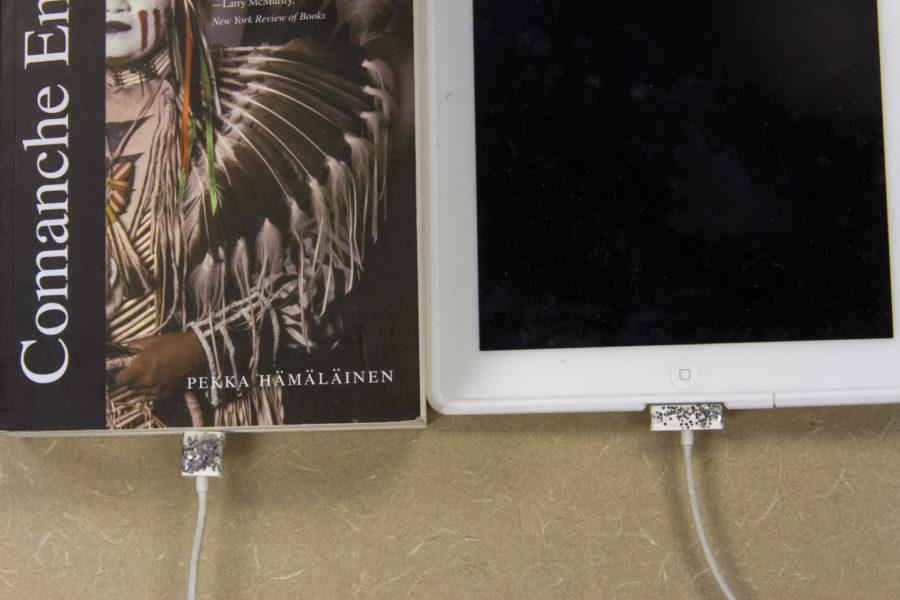Gross: Keeping the book industry afloat
Photo Illustration: Megan Wolff/Iowa State Daily
Opinion: Gross 1/24
January 24, 2013
As wonderful as our technology-ruled world is, the Internet and digital age are slowly suffocating a number of industries. Musical artists and their record companies have found it necessary to locate new avenues for their products, as have all those involved in the film and television business. Authors and publication companies have not escaped this fate either, although the literature business seems to be the most lacking in profitable solutions. Now that it is easy to purchase (or pirate) all such products online in a digital format, these and other industries have struggled to keep their heads above water.
Certain elements of the music industry are on their last leg. Cramped aisles filled with thousands of CDs in stores such as Best Buy are soon to be a thing of the past. They have been replaced with well-spaced arrays of the latest Apple, Samsung or Asus device, each accompanied by a suave employee who can’t wait to tell you how many albums, movies and books the tablet in question can hold. Despite widespread online piracy of music, artists still get quite a bit of income through radio royalties, tours and other promotions. In addition, sites such as Pandora and Spotify have stemmed the flow of illegally downloaded tunes, but it cannot be denied that physical copies of music are on their way out the door.
In the film industry, the plight of piracy is similar but the retaliation has been different in some aspects. Like Spotify, Netflix allows consumers to enjoy the industry’s product without having to purchase anything other than a monthly subscription. However, the sale of physical movie discs has been revitalized through a couple of methods. Firstly, the relatively new technology of Blu-ray discs encourages fans to purchase their movies in the most cutting-edge of forms. In addition, Blu-ray movies sold in stores often take on a three-version format, with a Blu-ray, DVD and digital copy all available in one purchase.
Books and other literature have suffered in the same way. Electronic devices such as Amazon’s Kindle and Barnes and Noble’s Nook have made books available to consumers in a more convenient, sleek form. However, replacing physical volumes with digital has made it so even literature can be easily and illegally downloaded off the internet. Though many readers are content to have their favorites stored in one small tablet, many book lovers eschew Nooks and Kindles and devotedly continue to buy novels in stores.
Since the beginning of the digital and internet age, the public has voiced concern about the fate of magazines, books, newspapers and other publications. The transition to digital media damaged the job market for those who worked in the industry. However, it wasn’t until the popular bookstore Borders announced bankruptcy in early 2011 that the literature-loving community became truly worried. Many felt apprehension for Barnes and Noble and Books-a-Million, not to mention the thousands of petite and charming bookstores that can be found in any city worth its salt. In this way, the dilemma of the literary publication industry is similar to that of the music industry in that the purchase of their physical products is falling steadily.
A possible solution seems evident when looking at what the film industry has done to preserve their market. Why can’t books be sold with multiple formats incorporated just as Blu-ray discs are? If books in Barnes and Noble or Amazon were sold with a digital copy included, it would help promote the industry in at least two ways.
If consumers could get the physical copy and the digital copy without having to pay for both, more Kindle and Nook users would be willing to buy actual books, as they would also automatically get it on their electronic devices. For book lovers who do not own a reading tablet, this solution might encourage them to purchase one. Being able to have beloved and tangible forms of favorite books as well as convenient digital versions would inspire consumers to begin purchasing books once more.
The current situation for literary publications may seem desperate, but it can be salvaged at least in part with a bit of inventiveness and compromise on the part of the businesses. Just as Blu-rays helped buoy the film industry when the digital age seemed to be taking over, this innovation could help save the book business, which otherwise, may drown.
——————————————————————————————-
Hailey Gross is a sophomore in English from Cedar Rapids, Iowa.

















